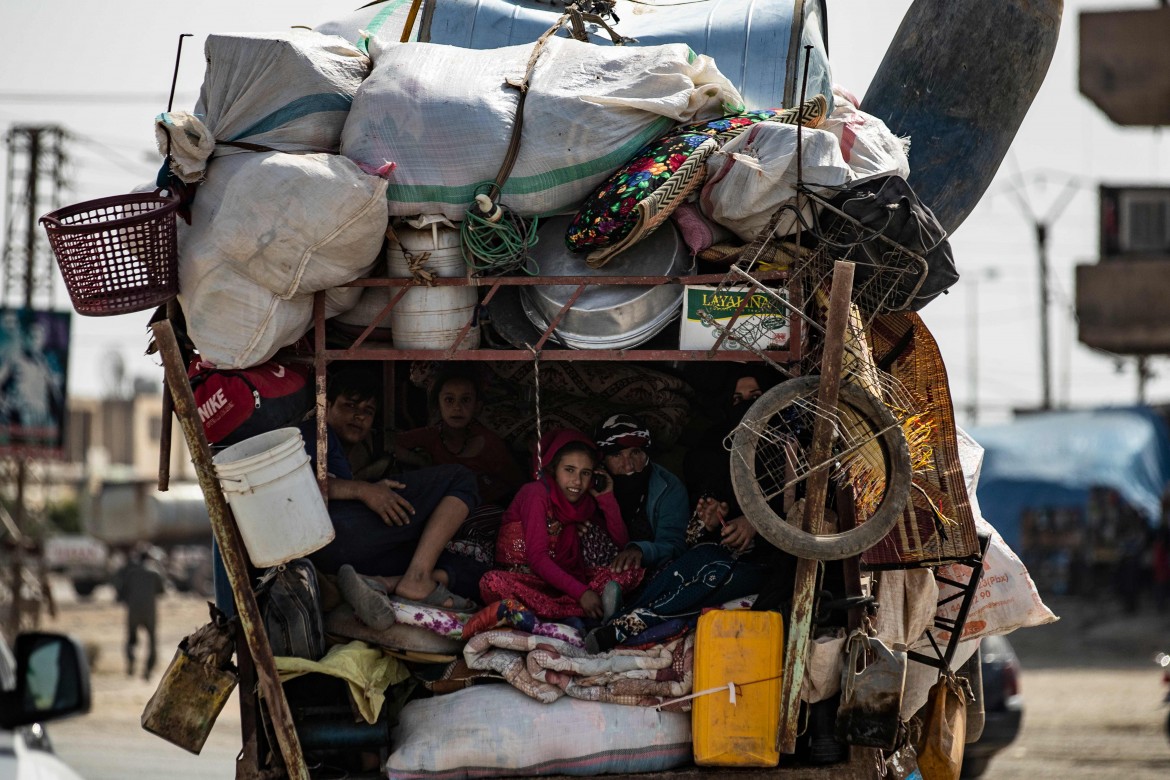“There are Arabs who are hosting Kurds, Christians who are hosting Muslims, the Arab tribes who have sent 50,000 fighters, just like the Christians, Armenians and Syrians did: this is the real victory of democratic confederalism, a model of coexistence that neither Trump nor Erdogan can defeat.”
Nilufer Koc is the co-president of the Kurdistan National Congress (KNK). We spoke with her on the phone during her trip to Brussels, in the heart of the European institutions that have been criticizing the Turkish operation in northern Syria for a number of days now, while carefully avoiding taking any concrete measures.
On Monday, the council of EU foreign ministers did not make any concrete decision. Are you exerting pressure so that the international institutions would act?
We are working to convince the European governments and international institutions to take concrete steps that would stop the Turkish occupation. Europe is condemning it in words, while Turkey is committing war crimes and crimes against humanity. We are witnessing a humanitarian catastrophe: the Turkish army are hitting water and power supply networks, hospitals and schools, and are engaged in ethnic cleansing at the border, claiming this is for “security reasons.” The autonomous administration had accepted the US-Turkey agreement on a buffer zone. Then, the Trump administration withdrew its troops without even notifying the SDF (Syrian Democratic Forces).
What are you asking the international institutions to do?
We are asking for diplomatic and economic sanctions, the suspension of Turkey’s EU accession negotiations and of Turkey’s membership in NATO. We are also pressing the international coalition to implement a no-fly zone to prevent further bombings immediately. We have received a lot of solidarity from people on every continent, and this is giving strength to the fighters on the ground. But what is needed concrete action, such as the closure of Turkish embassies. We need to isolate Turkey, as it is a threat to all of us. It wants a caliphate in northern Syria—this is not just our problem.
NATO has already shown Ankara support. And this has had an impact on the EU’s decisions.
Erdogan is invoking NATO’s Article 5, but he is the aggressor. Nobody Kurdish or Arabic has attacked the Turkish border in recent years. NATO is responsible for its members, including for punishing them if they violate the rules. It talks about stability, but is failing to stop the chaos and the Turkish crimes.
On Sunday, the SDF reached an agreement with the Syrian government. There is talk of a military deal. Will a political deal follow? In that case, could the model of democratic confederalism disappear?
Together with the international coalition, we have been fighting Erdogan’s proxies; today, alongside the Syrian government, we want to defeat their ringleader. Over the past eight years, the autonomous administration has always said that it was part of Syria, and there has never been any intention to declare independence. The door to dialogue has remained open, with the goal of having us recognized by the government as part of a process of democratization. The current dialogue between Rojava and Damascus will surely get to the point of a political deal: the current one is a military agreement that will have to translate to a political solution. At the moment, however, it is vital to protect the borders and prevent the Turkish occupation. There are no signs that would point to the disappearance of democratic confederalism, and in any case, Rojava will not give up: the people have created a political system for which they have paid a high price. It is a democratic model that does not harm anyone, and does not threaten internationally recognized borders or the sovereignty of Syria. It is a contribution to its democratization. None—whether Arabs, Kurds, Christians or Muslims—have any intention of giving it up: they have had a taste of freedom.
Moscow has initiated the negotiations between the SDF and Damascus. In this whirlwind of shifting alliances, do you trust Russia?
The current political situation in northern Syria is in a state of chaos. When we were fighting ISIS, our enemies were fascists, and, just as it happened in World War II, we formed alliances with those with whom we shared a common interest in defeating them. The priority was to eradicate ISIS, so we were flexible when it came to military alliances. Now, the same thing is happening all over again with Turkey, and again we are choosing to have flexibility. If Russia will support us militarily, we will work with Russia and with those who want to prevent this racist and fascist aggression. Trump has used us, and Russia should not make the same mistake. Because the Turkish aggression is not aimed solely against the Kurds: Erdogan wants a regional hegemony that would go beyond Rojava, and which is a danger to everyone.
Is Rojava still able to resist? There is talk of thousands of young people who are taking up arms, but also of hundreds of thousands of displaced persons.
The people have built democratic confederalism, and they intend to defend it. Many are joining the SDF—young and old, women and men. People are fighting because they are defending a society that is worth the risk. For the same reason, people are organizing assistance to communities through local organizations that manage the emergency medical system, and moving caravans that are bringing medicine to the affected areas. Those who are running away are not running out of the Rojava territories. It is here that they find basic solidarity, with people sharing food and shelter with those who are displaced.

